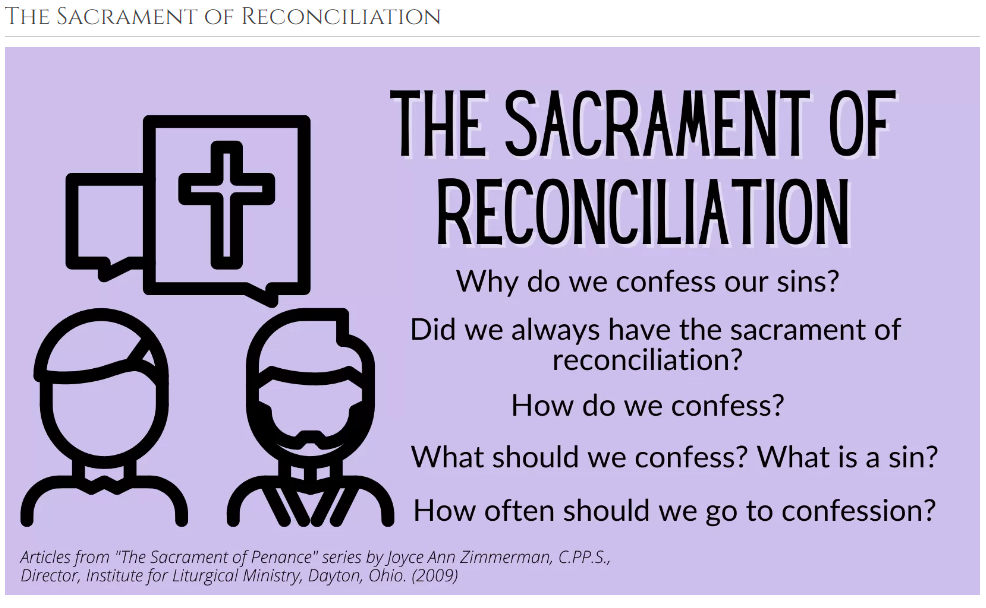Reconciliation/Confession
Confession Times
Wednesday: 5:15 PM to 6:15 PM
Saturday: 9:30 AM to 10:30 AM

Part 1: Why do we confess our sins?
Despite the fact that multitasking has become the order of the day for most of us, we are amazingly single-minded about tons of other things. When it comes to protecting our children, nothing gets in our way or distracts us. If we are engrossed in a TV show or sports event, we are oblivious even to the
cell phone ringing. We also tend to be pretty single-minded about the Sacrament of Penance: we only think of it in terms of sin. But, really, this sacrament has so much more to it than simply confessing a list of sins. It is true: confession includes telling our sins to a priest. But the sacrament is much richer than just this. Let’s take the blinders off and look at a wide range of positive fruits of this sacrament.
exerpted from "The Sacrament of Penance" by Joyce Ann Zimmerman, C.PP.S., Director, Institute for Liturgical Ministry, Dayton, Ohio. (2009)
Part 2: Did we always have the sacrament of penance?
Since Adam and Eve, where there are humans there are human weakness and sin. This is the “law” of our fallen human nature. It seems, though, like our “worst” brings out the very best in God. Throughout the history of humankind God has shown the divine self to be patient, faithful in extending divine mercy, and forgiving. The story of Abraham “bargaining” with God not to destroy the righteous along with the evil people of Sodom is a good case at point (see Gen 18:16-33; 19:12-29). God agrees to spare Sodom if fifty righteous people can be found; then Abraham bargains God down to forty-five righteous ones, then forty, then thirty, then twenty, then ten. Too bad the bargaining stopped at ten! Would not God have spared all, had just one righteous person been found? Of such is the mercy and forgiveness of God!
God’s compassion is embodied in the divine Son, Jesus. “Go . . . your sins are forgiven” seems to be
Jesus’ favorite announcement. He says these simple but profound and life-changing words to the paralytic man (Matt 9:2-6), the sinful woman who washes Jesus’ feet with her tears and dries them with her hair when Jesus is dining at the house of a Pharisee (Luke 7:36-50), to the woman caught in adultery whom the scribes and Pharisees brought to Jesus to condemn (John 8:3-11). Most importantly, the risen Jesus extended to his disciples the ministry of forgiveness (John 20:23), and this is the ministry continued in the Church even today.
exerpted from "The Sacrament of Penance" by Joyce Ann Zimmerman, C.PP.S., Director, Institute for Liturgical Ministry, Dayton, Ohio. (2009)
Part 3: How do we confess? The sacrament of penance today
Brouhaha. An apt word, perhaps, to describe the liturgical renewal called for by the Second Vatican Council. We’ve surely had a noisy and overexcited reaction to renewal: some like the changes, some don’t; some do them faithfully, some don’t; some hang onto the old ways of doing things, some don’t; some go too far, some go not far enough. And perhaps, too, there is no greater confusion than surrounds the Sacrament of Penance. Some lament that individual confessions have dropped so drastically; others lament that too many of those who do go to individual confession don’t seem to grasp that there has been any renewal of the sacrament at all.
exerpted from "The Sacrament of Penance" by Joyce Ann Zimmerman, C.PP.S., Director, Institute for Liturgical Ministry, Dayton, Ohio. (2009)
Part 4: What do we confess? how do we know what sin is?
After Cain killed Abel out of jealousy, the LORD asked Cain, “Where is your brother, Abel?” to which Cain replied, “I do not know; am I my brother’s keeper?” (Gen 4:9). Yes, indeed, we are our brother and sister’s keeper because, in Christ, we share the same identity; we are all members of the same Body. All too often, however, we human beings forget about our close relationship with God and others. It is so easy for us to push love from our hearts, make our own selves the center of our lives, and demand that everything and everyone bow to our wishes and desires. Sin is a very real thing. God created us in the divine image, and we were created “very good.” Yet sometimes we reject that goodness, put our own will ahead of God’s will, and choose to isolate ourselves from the love that is freely offered us and surrounds us.
exerpted from "The Sacrament of Penance" by Joyce Ann Zimmerman, C.PP.S., Director, Institute for Liturgical Ministry, Dayton, Ohio. (2009)
Part 5: How often & when ought we confess?
Procrastination is often a corollary of what we perceive as an unpleasant task. And for most of us, going to confession isn’t exactly our favorite activity! Putting it off or, much worse, ignoring the grace of this sacrament by not availing ourselves of its peace and joy is not a good choice if we wish to grow in our love of God and neighbor. One way to help ourselves get into a good habit of receiving this sacrament of healing and forgiveness is to pay attention to the non-sacramental ways that confession and reconciliation present themselves to us. These, then, help us to prepare for and even to anticipate with joy the celebration of this sacrament of peace.
Many opportunities come up each day that help us recognize and face our own human weakness, as well as the deliberate sins we commit. As St. Paul laments, he does “not understand my own actions. For I do not do what I want, but I do the very thing I hate” (Rom 7:15). He goes on to explain that sin has taken hold of him and dwells within him. This is the human condition which we inherit from Adam and Eve, this propensity to do wrong. Each day we must recognize when we give in to this urge to wrongdoing, and then do whatever is necessary to change our ways.
exerpted from "The Sacrament of Penance" by Joyce Ann Zimmerman, C.PP.S., Director, Institute for Liturgical Ministry, Dayton, Ohio. (2009)



